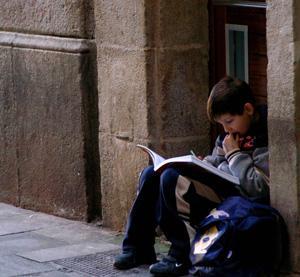
Image courtesy of The Divine Miss M. under a Creative Commons license: BY-ND.
This course explores techniques for assessment of reading and writing skills and for development of individualized instruction in classroom settings; develops strategies for meeting the needs of individual students through the evaluation, utilization, and adaptation of commercial reading materials and through the formation of principles and techniques for producing effective teacher-prepared materials.
Instructor: Annemarie Sullivan Palincsar
dScribe: Jessica Thudium
Course Level: Undergraduate
Course Structure: 3 hour lecture and one discussion class weekly
Syllabus
Syllabus
Introduction
The distinction between learning to read and write and using reading and writing to learn is, in many respects, artificial. As you learned in Education 401, very young children express themselves in drawing and other written forms of representation before they write conventionally and very young children are engaged in “reading” the world, and in fact, reading text, before they are able to read conventionally. That said, typically, the focus of literacy instruction in the primary grades is on: helping young children learn the alphabetic principle, supporting them in the use of invented spelling and writing, and engaging them in shared reading as they acquire an understanding of the forms and functions of written language. As children proceed through the grades, the expectation is that they will independently use reading and writing for the purposes of developing knowledge of subject matter (e.g., science, social studies, and mathematics), literature, the world, and themselves. When students reach the upper elementary and middle school grades, our attention as literacy educators is increasingly focused on: comprehension, vocabulary, fluency, and composition so that our students have the tools and dispositions to construct meaning through reading, writing, viewing, and speaking.
Course Goals
- To begin developing a deeper understanding of the kinds of texts that students in the upper-elementary and middle-school grades are expected to read, and the array of purposes for which they are expected to read,
- To begin to learn how to analyze texts for their challenges and opportunities, so that instruction can be planned accordingly,
- To begin developing an understanding of the instructional strategies that support student engagement in self-regulated learning from text,
- To begin to develop the knowledge and skills necessary to engage in productive discussions with text
- To begin developing a deeper understanding of writing and aspects of the craft of writing, including the conventions of grammar, mechanics, and usage,
- To continue to develop an understanding of vocabulary development and instructional strategies that support that development,
- To continue to develop your understanding of reading assessments appropriate for upper-elementary and middle-school children and youth,
- To develop thoughtful and motivating literacy assignments related to literature and content-area texts,
- To explore the productive use of information and communication technologies to advance student learning,
- To continue to advance your thinking about the kind of classroom culture you wish to cultivate and how the curricular and pedagogical decisions you make will influence that culture,
- To continue to support your thinking about the ways in which instructional decisions must be shaped by issues of: development, and individual linguistic, cognitive, and cultural differences,
- To advance your capacity to design literacy programs that reflect your knowledge of curriculum, assessment, instruction, and state and national standards,
- To continue to support the development of your identity as a literacy educator, including learning about professional resources and organizations that can support that identity.
What We Will Learn to Do
In addition to the knowledge and skills identified in the preceding goals, we are committed to your leaving this class prepared to undertake the following practices that are integral to being a competent teacher of literacy:
- Conduct language and word study,
- Plan and lead reading workshops that include independent reading, guided reading, and literature study,
- Plan and lead writing workshops,
- Administer and interpret the Qualitative Reading Inventory,
- Prepare for, enact, and evaluate a text-based discussion, using content area text, for the purpose of promoting knowledge building.
Structure of the Course
A topic (or two) has been selected for each class session. Typically, there will be a related reading and interactive lecture regarding this topic. In addition, there will be the opportunity to experience a literacy activity that would be appropriate for use in an upper elementary/middle school classroom. These activities will be designed to model the components of a language arts block. We will participate in these activities as both learners and prospective teachers. Finally, there will be several assignments that will be field-based and incorporated in our class discussions.
Schedule
Course Schedule
Week 1
Orientation to the Course
Defining Reading Comprehension
Characterizing the Self-Regulated Reader
Week 2
Building an understanding of why students struggle with literacy achievement and what we, as teachers, can do about these struggles
Week 3
The big picture of language arts instruction
Orientation to the activity of using a class-wide novel: Out of the Dust
Week 4
Word and language study
Guided Reading
Writing workshop with Out of the Dust
Week 5
Word and language study
Guided Reading
Writing workshop
Week 6
Word and language study
Guided Reading
Writing workshop
Supporting the literacy learning of English-language teachers
Week 7
Planning for - and conducting - productive discussions with text
Writer's workshop
Week 8
Assessment in reading and writing
Week 9
Second text-based discussion, collection and use of record of practice
Week 10
Debriefing on text-based discussions
Debriefing regarding vocabulary lessons
Discussion of independent reading
Week 11
Debriefing regarding word study lessons
Teaching from content area text
Writer’s workshop
Week 12
Introduction to Basal Reading Programs
Week 13
Wrap Up
Reading List
EDU 403 Uses the Following Books
Barone, D. M. (2006). Narrowing the literacy gap. What works in high-poverty schools. New York: Guilford.
Bear, D. R., Invernizzi, M., Templeton, S., & Johnston, F. (2008). Words their way: Word study for phonics, vocabulary, and spelling instruction. New Jersey: Merrill.
Beck, I. L. & McKeown, M. G. (2006). Improving comprehension with Questioning the Author. New York: Scholastic.
Beck, I. L., McKeown, M. G., Kucan, L. (2002). Bringing words to life: Robust vocabulary instruction. New York: Guilford.
Fountas, I. C. and Pinnell, G. S. (2001). Guiding readers and writers. Teaching comprehension, genre, and content literacy. Portsmouth, NH: Heinemann.
Hesse, K. (1997). Out of the Dust. New York: Scholastic.
In addition, selected readings for this course will be posted to CTools and you will be provided with copies of Leslie, L. & Caldwell, J. (2000). Qualitative Reading Inventory. New York: HarperCollins College, which we will share and use to complete the assessment assignment.
About the Creators

Annemarie Sullivan Palincsar is the Jean and Charles Walgreen Jr. Chair of Reading and Literacy at the University of Michigan School of Education. Her research focuses on the design of learning environments that support self-regulation in learning activity, especially for children who experience difficulty learning in school. Professor Palincsar also studies the role of computer-assisted instruction in enhancing children’s understanding of subject matter text and web-based text. She was named a Thurnau Professor in 2006 in honor of her contributions to undergraduate teacher education. She is the co-editor of the journal, Cognition and Instruction, and a member of the National Academy of Education. Professor Palincsar received her PhD from the University of Illinois, Urbana-Champaign. more...
- Ph.D., University of Illinois at Urbana-Champaign
- M.S., University of Illinois at Urbana-Champaign
- B.S., Fitchburg State College

Image courtesy of The Divine Miss M. under a Creative Commons license: BY-ND.
Jump to:
| Document Title | Creator | Downloads | License |
|---|---|---|---|
|
Syllabus |
Annemarie Sullivan Palinscar
|
| Document Title | Creator | Downloads | License |
|---|---|---|---|
|
Week 01: Field-Based Activities |
Annemarie Sullivan Palinscar
|
||
|
Week 01: Guiding Questions for Chapter 18 of Fountas and Pinnell |
Annemarie Sullivan Palinscar
|
||
|
Week 01: Inventory and Interview |
Annemarie Sullivan Palinscar
|
||
|
Week 01: Reading Guide for Narrowing the Literacy Gap |
Annemarie Sullivan Palinscar
|
||
|
Week 02: Guiding Questions for Fountas and Pinnell, pages 30-87 |
Annemarie Sullivan Palinscar
|
||
|
Week 02: Researching "The Dirty Thirties" |
Annemarie Sullivan Palinscar
|
||
|
Week 02: Student Survey of Popular Culture Interests |
Annemarie Sullivan Palinscar
|
||
|
Week 04: Vocabulary Guidelines |
Annemarie Sullivan Palinscar
|
||
|
Week 06: Questioning the Author |
Annemarie Sullivan Palinscar
|
| Document Title | Creator | Downloads | License |
|---|---|---|---|
|
Week 01: Class Orientation and Reading for Meaning |
Annemarie Sullivan Palinscar
|
||
|
Week 02: Literacy Achievement |
Annemarie Sullivan Palinscar
|
||
|
Week 03: Word Study and Writer's Workshop |
Annemarie Sullivan Palinscar
|
||
|
Week 04: Guided Reading, Word Study, and Writer's Workshop |
Annemarie Sullivan Palinscar
|
||
|
Week 04: Vocabulary Instruction |
Annemarie Sullivan Palinscar
|
||
|
Week 05: Writer's Workshop |
Annemarie Sullivan Palinscar
|
||
|
Week 06: ELL Instruction |
Annemarie Sullivan Palinscar
|
||
|
Week 06: Questioning the Author |
Annemarie Sullivan Palinscar
|
||
|
Week 07: Assessment in Reading and Writing |
Annemarie Sullivan Palinscar
|
||
|
Week 08: Planning and Enacting Text-Based Discussions |
Annemarie Sullivan Palinscar
|
||
|
Week 09: A Closer Look at Independent Reading |
Annemarie Sullivan Palinscar
|
||
|
Week 10: Comprehensive Language Arts Program |
Annemarie Sullivan Palinscar
|
||
|
Week 11: Multimedia Literacy |
Annemarie Sullivan Palinscar
|
| Document Title | Creator | Downloads | License |
|---|---|---|---|
|
Week 03: 1st Test-Based Discussion Project |
Annemarie Sullivan Palinscar
|
||
|
Week 08: Administering and Scoring Guidelines for QRI Assignments |
Annemarie Sullivan Palinscar
|
||
|
Week 09: Analyzing your 2nd Text-Based Discussion Project |
Annemarie Sullivan Palinscar
|



